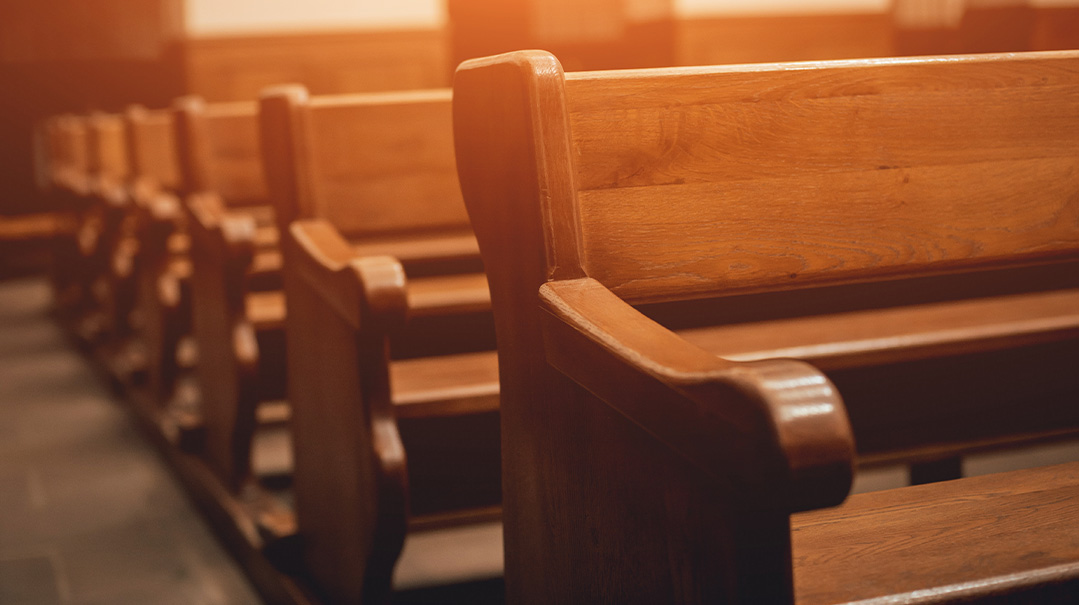GE-BENCH-T!
| March 14, 2023The solution was a mere few feet away. I just had to act on it

The women’s section in the Boro Park Amshinover shul could barely fit my nephew’s family (he was the youngest of many, kein ayin hara), and his mother’s friends (beloved by all, she had a lot).
Then we heard it would be a double simchah; another mispallel’s son was getting married the same week as my nephew.
Would the shul expand like the Beis Hamikdash?
Well, the walls couldn’t expand, so our hearts would have to.
I arrived at shul earlyish on Shabbos morning, when there was still ample place to sit. One woman, then another one, entered the shul, filling up the ezras nashim. It was as if droplets of water had suddenly formed a large puddle, then caused a flood.
Two older women walked in. I could no longer stay put; the newcomers had nowhere bekavodig to sit.
The solution was a mere few feet away. I just had to act on it.
There was a table next to the back wall. To conserve space, instead of chairs, a bench had been placed between the wall and the table. Practical — yes. Inviting — no. I think people naturally resist locking themselves into a spot they can’t get out of without inconveniencing the people sitting next to them.
There’s barely any room to stand for Kaddish and Shemoneh Esreh. I slid myself onto the bench. My sister joined me, and soon enough we were hemmed in by another woman or two. (Aisle seats aren’t only preferred on planes.)
The discomfort evaporated as a tingling of something joyous coursed through me. This very seat was the one my mother a”h occupied for close to two decades. I berated myself for having resisted a seat I should’ve sought out. Now, even 19 years after her petirah, I felt my mother’s presence.
The harder the bench pressed into me, the more cramped I felt, and the less room I had to maneuver myself during Kedushah, the more uplifted I was. The more I thought about how my mother chose this less-than-desirable seat, the more I marveled at her willingness to be content with a second-class spot, not just in shul, but in life. And that’s what made her take first place in my — and others’ — eyes. Her opting to sit in the back, on a hard, uncomfortable bench, highlighted her good middos.
Then I thought: A bench for a bench!
My mother had been skin and bones toward the end of her life, when she’d battled cancer of the digestive system. Holding on to her dignity and independence, she didn’t want to use a wheelchair to get to her doctor’s visits. She managed the walk from the car service to the elevator, but heading home was a challenge. Pre-cell phone days, she didn’t have the luxury of a “will be there in two minutes” text.
After her doctor’s appointment, we’d estimate the time it would take for the car service to arrive, and go down to the lobby to wait. For a starving, sick woman who could barely stand on her feet, even ten minutes, a relatively short time to wait for a service, is “hours” long.
A building without a bench in the lobby? you ask. The same question hounded me. At the next visit, I voiced my surprise to the oncologist. He apologized profusely, but said his hands were tied. The management refused to provide patients a place to sit, citing safety concerns and insurance issues. End of conversation, but not end-of-bench-campaigning for me. I’d sidestep the management and go to the top.
Hashem helped me reach someone who supplied me with the building owner’s contact information (confidentially, of course). She suggested that a real estate mogul like the building owner wouldn’t listen to a young woman asking him to take on the insurance company. I countered: He still has a Yiddishe heart.
I wrote a letter to him with a prayer on my lips. In it, I described the problem, painting a picture of my mother’s duress, her legs buckling as she waited for her car, and begged him to put a bench in the lobby.
The oncologist’s secretary knew I was working on the case. A few months later, not long after my mother’s petirah, she called me with the news that a bench had been installed in the lobby.
Some days later, I was back at my computer, describing how overcome with emotion and gratitude I was that he’d installed the bench, how this small addition would help so many people who unfortunately were forced to visit the oncologist.
I wrote that letter. Mr. Mogul took action. But I’m convinced it was my mother’s willingness to sit on that bench in shul (and in life) that gave her the zechus to be the catalyst for chesed with a bench!
Written l’illui nishmas my mother Golda (Erlich) bas Avrohom and my mother-in-law Devora (Kviat) bas Moshe Yehuda HaKohein. My mother-in-law made sure to always have a bench placed in front of her house so passersby could sit down and rest.
(Originally featured in Family First, Issue 835)
Oops! We could not locate your form.







